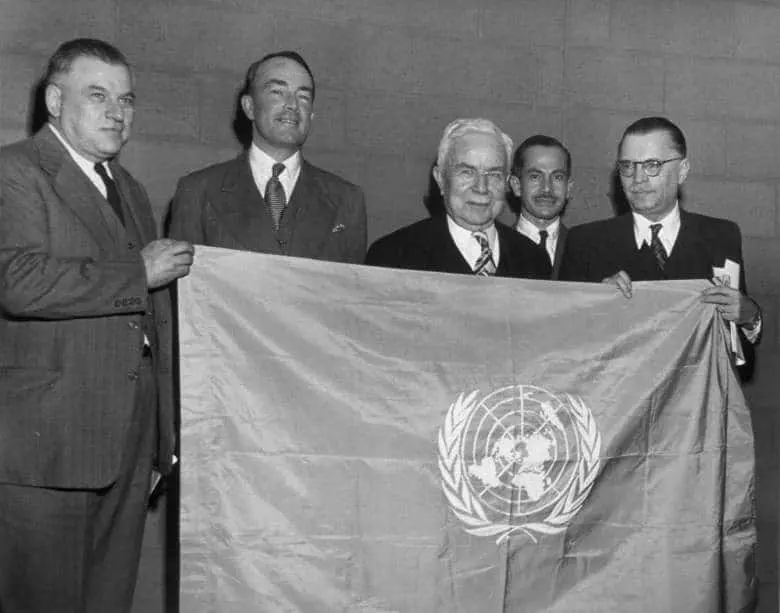The New York Times publishes a material with an outline plan that “intends to exterminate the Bulgarian population in Macedonia”. The lowering of the Iron Curtain in practice facilitates the deepening of terror there.
In a series of publications, the Trud Newspaper reports on little-known or unknown facts from the struggles of the Macedonian Bulgarians in the period 1944-1991. This material was prepared by Spas Tashev, associate professor of statistics and demography at the Institute for Population and Human Studies at the Bulgarian Academy of the sciences.
One of the most significant achievements for humanity after the end of World War II was the establishment in 1945 of the United Nations. Its main goal is to preserve world peace by committing itself to solving important global and regional problems. This also affects the development of the Macedonian issue.
During this period, Greece experienced the first major armed conflict in Europe since the end of World War II, which lasted until 1949. As most of the hostilities took place in its northern parts, the UN was forced to consider the situation in the Central Balkans. whose core is the geographical area of Macedonia.
This led to the activation of the Macedonian Patriotic Organizations (IGOs) in America and on November 10, 1946, a delegation of Kosta Popov, Lyuben Dimitrov, Metodi Chanev and the priests Georgi Nikolov and Vasil Mihailov from Macedonia left for the UN headquarters in New York. -Bulgarian churches “St. Kliment Ohridski ”in Detroit and“ St. George ”in Toronto. They are joined by Professor Albert Laibaer, President Wilson’s adviser on Balkan issues and a former member of the US delegation to the Paris Peace Conference. He arranged for the group to be received by Eleanor Roosevelt, a UN official and wife of the late US President Theodore Roosevelt. Afterwards, a meeting was held with Andrew Cordier, executive secretary of the world body, who was handed a memorandum with a request that confuses the plans of a number of Balkan countries – the creation of a free and independent Macedonia under the auspices of the UN.
This first visit of a delegation of the Macedonian-Bulgarian emigration to the UN is of historical significance, because the presented facts became the reason for the establishment of a UN commission of inquiry for the Balkans in the beginning of 1947. The US representative in it, Mark Etridge, wrote on this occasion that “the commission is authorized to deal with the Macedonian issue. It is one of the problems on the basis of which the Security Council set up this commission. ” In 1948, the commission made one of its most important findings for us – that 90% of the children raised by the partisans of Gen. Marcos are “of Slavic-Bulgarian origin.”
Following the activities of the UN representatives in the Balkans, on October 4, 1949, the Central Committee of the IGO sent a telegram to the Secretary General Trigwe Lee with a request “to defend the Bulgarian-speaking people in Macedonia the God-blessed right to pray and speak freely. in their centuries-old mother tongue ”.
The existing practice of blocking various initiatives, leading to the impossibility or slow decision-making in the Political Committee, caused a second delegation of IGOs to arrive at the UN headquarters on October 17, 1949. The circulated document emphasizes the need to “guarantee the right of Macedonian Bulgarians to freely use their native language, as well as to pray to God in their temples in their own language.” The response from this action is great. The next day, the New York Times published an article outlining the plan to “exterminate the Bulgarian population in Macedonia.”
The lowering of the Iron Curtain in practice facilitates the deepening of terror in all parts of Macedonia. The brutal murder of five Strumica students from the UDBA in 1951 caused Macedonian Bulgarians to send a telegram to the chairman of the UN general session in Paris, Dr. Luis Padilla Nervo, on November 20th. The presented information is sent for consideration at the next meeting of the Human Rights Commission.
As the repression of the Macedonian Bulgarians did not stop, on April 28, 1952, an IGO delegation visited the UN for the third time. Her work is supported by the American Prof. Frederick Krueger from the University of Valparaiso. UN Secretary-General Trigwe Lee has been handed a petition detailing the repression and highlighting the need to respect the human rights of Macedonian refugees.
In the ensuing period, Macedonian patriotic organizations made five more visits to the UN headquarters in New York – in 1954, 1959, 1960, 1969 and 1972. The memorandum circulated in 1969 was especially important, as the document concerned the suppression of human rights. in Yugoslavia to both Macedonian Bulgarians and Croats. For this purpose, a joint Bulgarian-Croatian delegation was formed, which visited the world organization.
In all these diplomatic actions, the trampled human rights of the Macedonian Bulgarians have absolutely always been defended. For example, during a visit to New York on February 17, 1972, the chairman of the Central Committee of the IGO Petar Atsev and his deputy Hristo Anastasov handed over a “Declaration-protest in connection with the anti-Bulgarian national genocide in Macedonia under Tito’s slavery.” This document, against the background of the Yugoslav pressure on the students from the Socialist Republic of Macedonia studying in Bulgaria, examines the behavior of the Macedonian Minister of Interior Ivan Ginovski, who ordered the Ministry of Interior to gather the parents of these students in Bitola and sent them the following accusations: “The young people, while studying in Bulgaria, showed obvious signs that their Macedonian national consciousness was faltering and that they were progressively weakening.
They loved the Bulgarian language more, therefore they “cheated on their homeland”. Where do our efforts to build our nation go, when the young people, even with a short contact with the Bulgarian culture and public, succumb to its influence? Bulgarians are the number one enemy of Macedonia and the Macedonian nation, we will not allow our youth to betray us. “
In addition to direct contacts with leading figures in the world organization, the Central Committee of the IGO has prepared 13 memoranda addressed directly to the UN Secretary General – two in 1953 and one each in 1954, 1955, 1956, 1960, 1968, 1969, 1970, 1972, 1974, 1976 and 1978. In addition to these documents, some of the annual congresses also adopted declarations to the UN, as was the case in 1953 and 1976. All this makes the topic of defending the Bulgarian cause at the UN a vast one.
However, the main conclusion is that the leading line in the documents of the Macedonian Bulgarians, served at the UN, is the assertion of the Bulgarian character of Macedonia. For example, the Central Committee of the IGO protested to UN Secretary-General Kurt Waldheim that on December 10 – declared Human Rights Day – the chairman of the 32nd session of the UN General Assembly, the Yugoslav representative Lazar Moisov, spoke about the importance of the Universal Declaration of Human Rights, while at the same time “in Yugoslavia, and especially in the occupied part of our homeland Macedonia, the principles that Lazar Moisov praises in words are brutally violated.” After citing a number of examples of human rights abuses by Bulgarians in Macedonia between 1970 and 1978, the document states that “there is no written law in Yugoslavia that defines persecution and punishment of Bulgarians, only because they are Bulgarians. But the entire state policy of Yugoslavia is directed against them. In practice, the police, the school, the press, the barracks, the local “science”, etc. systematically carry out a cultural and national genocide against the local Bulgarians. “
Unfortunately, the situation in Skopje today has not changed significantly, which is why the documents distributed by the Macedonian Bulgarians at the UN are extremely important. They must know each other and become part of the modern argumentation in defending the Bulgarian position on Northern Macedonia.







